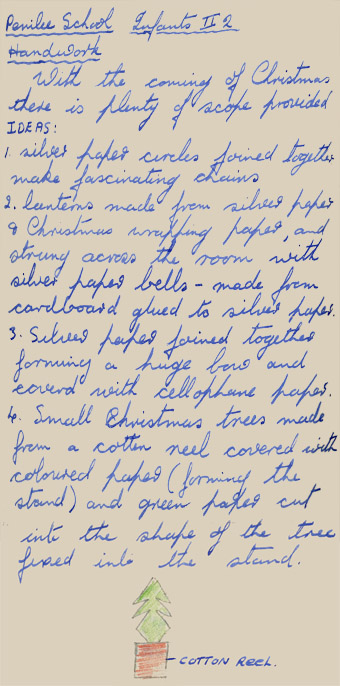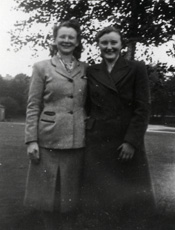Teaching practice diary of Marie McCallum McDougall (ref: JCE/22/5/6). Miss McDougall trained as a primary school teacher at the Glasgow Provincial Training College (later known as Jordanhill College of Education) from 1945-48. The course required her to spend several hours each week on placement in one of the local schools, observing the teachers’ classroom techniques. In her first year, she was placed at Napiershall Street School in Glasgow; in her second year, at Penilee Primary School in Glasgow; and in her final year she spent four weeks at Arrochar Primary School in Tarbet, and the remainder of the session at Banknock School near Falkirk. Like the other students, Miss McDougall kept a detailed record of her placement sessions, which had to be signed off by the headmaster of the host school.
Miss McDougall was immediately struck by the order maintained at Napiershall Street School, observing that even the infant class ‘tiptoe[d] quietly to take off their coats and hats.’ Their teacher had to work hard to hold the pupils’ attention – a problem ‘caused more by the boys than the girls’ – but succeeded by means of speaking to them clearly and distinctly, varying her manner of teaching lessons, giving the children drill every now and then, and ‘praising each child, for smart answers, good behaviour, and any small sparks of brightness’. Where reading lessons were concerned, ‘praising and the promise of a nice new reading book’ was enough to render all the pupils ‘eager and enthusiastic’. Miss McDougall also noted that the infant class loved to sing and recite nursery rhymes, and that those with the loudest and clearest voices were allowed to stand at the front of the room to lead the others.
At the same school, she watched the teacher of class III a) employ numerous techniques to ensure discipline, such as having the children sit with their hands behind their heads whilst the register was taken, and giving pupils a black mark against their name for every display of disobedience. Similarly, ‘A black mark is taken off when obedience is shown at any time.’ Anyone with dismal memories of school maths lessons will surely sympathise with this unfortunate class, who were
. . . somewhat backward especially in arithmetic. They are doing a revision of tables, and division seems very difficult to them. Constant slogging at tables and division is done every morning, first mentally, then in their squared paper jotters.
However, at Napiershall Street Miss McDougall also discovered that ‘A lesson should begin by showing its attractive side first’, and that ‘All work should be “play” for infants’. Oral composition was accordingly taught through word games such as ‘the Minister’s Cat’, where each child in the class suggested an adjective to describe the cat’s appearance and personality.
Miss McDougall’s placement diary also contains many ideas for primary school handwork (craft) lessons. For example, at Penilee, with Christmas approaching, the ubiquitous silver paper was employed to make a variety of decorations:

